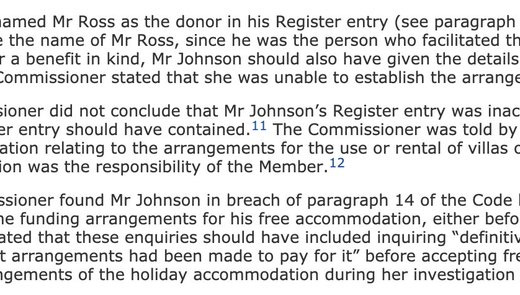Who is paying for Boris Johnson's holidays and what do they expect in return?
There is a pattern of the prime minister placing himself in debt to others.
Boris Johnson’s spokesman repeatedly refused on Monday to confirm who has paid for Boris Johnson’s holiday to Marbella.
Pushed on the question, Downing Street would only say that the prime minister would disclose any donations he has received, if required to do so, at a later date.
The caginess from Johnson’s spokesman follows reports that the prime minister is currently staying at a villa owned by the Conservative peer Zac Goldsmith.
Goldsmith, who is a close friend of both Johnson and his wife, was handed a peerage by Johnson, despite having been rejected by voters three times in just four years.
Downing Street on Monday refused to confirm, or deny, that the prime minister was being hosted by Goldsmith, or if anyone else had paid for his trip.
However, if the reports are true, then this is the third time in recent years that Johnson has accepted free holidays from prominent supporters and/or Conservative donors.
While Mayor of London, I revealed how Johnson had repeatedly accepted free holidays from Evgeny Lebedev, the son of a Russian Oligarch and former KGB officer.
At the time Johnson’s spokesman insisted the trips were an opportunity for Johnson to “relentlessly promote his vision for London,” to Lebedev, who owns London’s only dedicated newspaper, the Evening Standard.
More recently Johnson accepted free accommodation on the island of Mustique for himself and his then fiancee Carrie Symonds.
The exact details of that trip remain murky.
Johnson initially claimed that the Conservative donor David Ross, who previously resigned from Johnson’s mayoral administration following a share scandal, had paid for the trip, only for Ross to then deny this, before later changing his story.
Two separate investigations by the Parliamentary Commissioner for Standards and the Committee on Standards disagreed over whether Johnson had broken parliamentary rules, with neither quite getting to the bottom of the issue.
Why does it matter?
There is a broader pattern here of the prime minister accepting, or soliciting donations from others, while only belatedly declaring them.
Whether it is the refurbishment of his Downing Street flat, the tens of thousands of pounds worth of luxury takeaways he received during lockdown, or his multiple free trips paid for by donors and supporters, Johnson has a history of placing himself in the debt to wealthy individuals, in order to maintain his own lifestyle.
We do not know what, if anything, these individuals expect in return for their generosity to the prime minister.
Such questions extend beyond Johnson.
In the past year the coronavirus pandemic has revealed a pattern of Johnson’s government handing lucrative contracts to companies with links to the Conservative party.
One fifth of Covid contracts awarded by the government between February and November 2020 “contained one or more red flags for possible corruption,” according to the campaign group Transparency International.
This pattern of behaviour appears to be continuing.
Later this week the government will reveal whether it has given the green-light to a project run by a company, which is fronted by individuals who have given £1.4 million to the Conservative party.
In this context, the question of exactly who Johnson may be in debt to, and what his creditors expect in return, is more important than ever.







